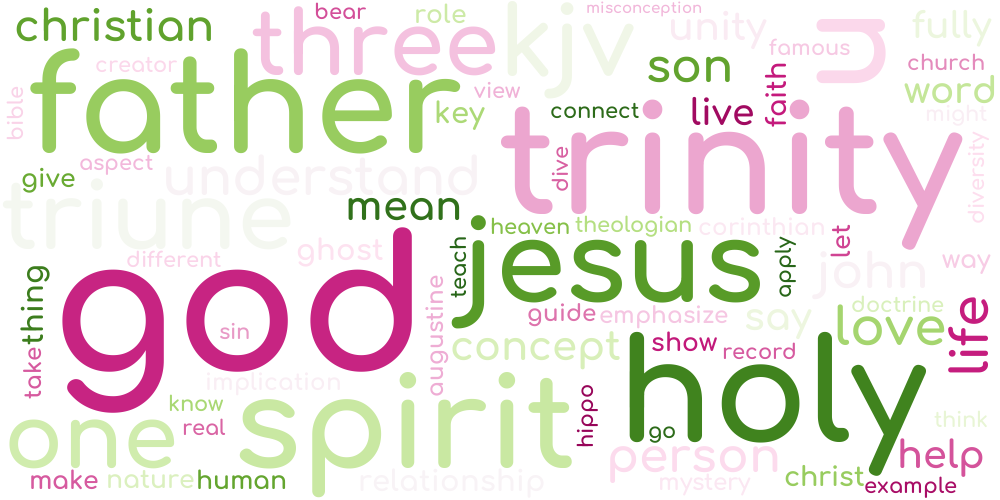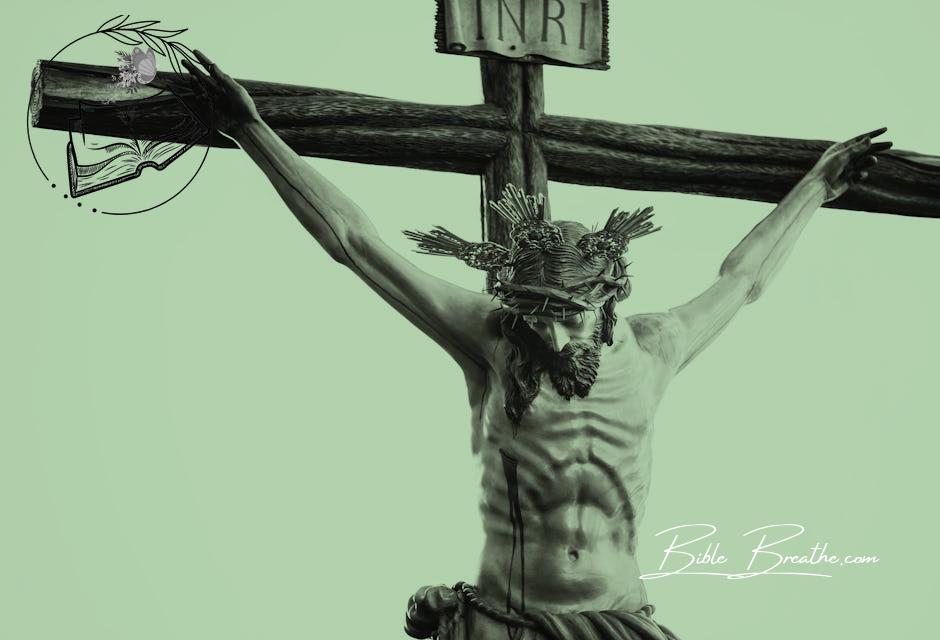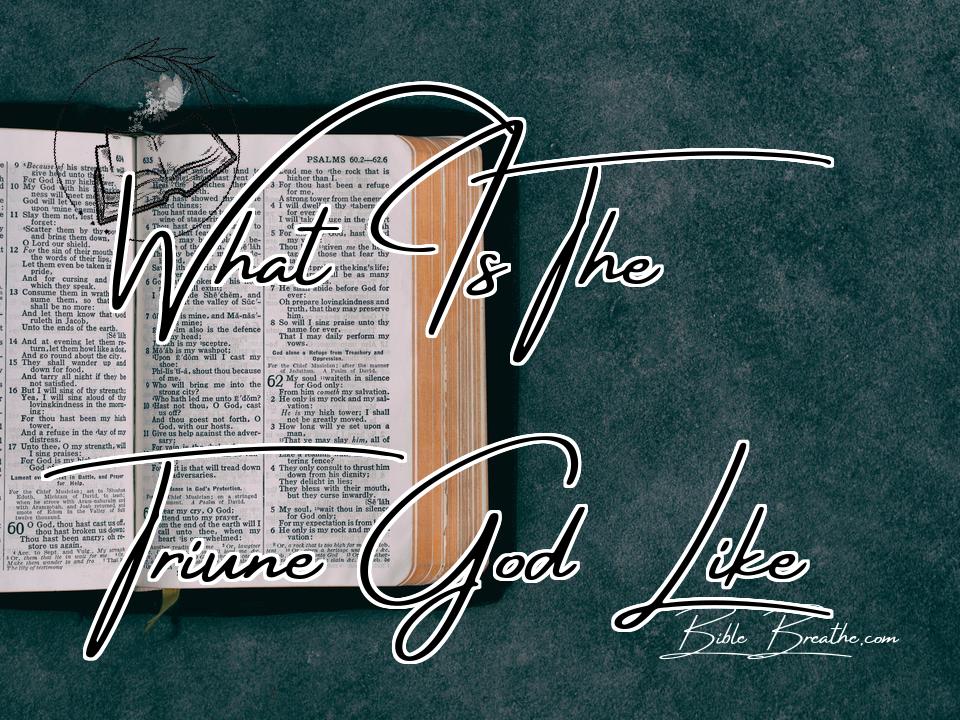Key Takeaways
- The concept of the Triune God, also known as the Trinity, is a central doctrine in Christianity, describing God as one being in three distinct, yet coequal and coeternal persons: the Father, the Son (Jesus Christ), and the Holy Spirit.
- The Bible teaches that each person of the Trinity has distinct roles and relationships, yet they are all fully God and indivisible (Matthew 28:19, 2 Corinthians 13:14).
- The Father is often depicted as the creator and sustainer of the universe, while Jesus is seen as the redeemer and savior of humanity, and the Holy Spirit is often associated with inspiration, guidance, and empowerment (Genesis 1:1, John 3:16, Acts 2:38).
- The Trinity is not a single person with three different names, but rather three distinct persons who are united in their essence and purpose (Deuteronomy 6:4, Isaiah 48:16).
- The Bible does not fully explain the nature of the Trinity, but rather presents it as a mystery that is to be accepted by faith (1 Timothy 3:16, Romans 11:33-36).
- The concept of the Trinity has been the subject of much theological debate and exploration throughout Christian history, with many different interpretations and understandings emerging over time Theology of the Trinity.
Introduction
Definition of the Triune God
So, what is the Triune God like?
The term “Triune” might sound fancy, but it’s actually pretty simple. It just means one God in three persons: the Father, the Son (Jesus), and the Holy Spirit.
Think of it like a three-leaf clover: each leaf is distinct, but they’re all connected and part of the same plant.
| Person | Description |
|---|---|
| God the Father | The Creator, our Heavenly Father |
| Jesus the Son | Our Savior, the one who died for our sins |
Importance of Understanding the Nature of the Triune God
So, why is it so important to understand the Triune God?
Well, it’s like trying to put together a puzzle without knowing what the finished picture looks like.
If we don’t understand the nature of God, we might end up with a distorted view of Him, and that can affect our relationship with Him.
For there are three that bear record in heaven, the Father, the Word, and the Holy Ghost: and these three are one.” (1 John 5:7, KJV)
As the famous theologian, Augustine of Hippo, once said, “In the things that are preached, you should rather look for a connection with the triune God than a manifestation of one of the persons.
Let’s start with a glance at this word cloud, highlighting the key themes we’ll explore.

Word cloud by BibleBreathe.com about what is the triune god like
The Trinity in Christian Theology

Photo modified by BibleBreathe.com. Original photo by Pixabay on Pexels
Historical Development of the Concept of the Trinity
Let’s dive into the Trinity.
It’s a mind-blowing concept that has been a cornerstone of Christian theology for centuries.
But have you ever wondered how this idea developed?
The concept of the Trinity wasn’t always clearly defined.
In fact, it took several centuries for the early Christian church to fully grasp and articulate this doctrine.
Here’s a brief rundown of how it all went down:
- Early Christian writings: The apostles and early Christian writers like Paul and John hinted at the Trinity in their writings, but it wasn’t explicitly stated.
- Council of Nicaea (325 AD): The concept of the Trinity started to take shape as Christian leaders gathered to discuss the nature of Christ. They affirmed that Jesus was fully God and fully human.
- Council of Constantinople (381 AD): The Trinity was further solidified as Christian leaders declared that the Holy Spirit was also fully God.
Biblical Basis for the Doctrine of the Trinity
So, what does the Bible say about the Trinity?
While the word “Trinity” isn’t explicitly mentioned, there are plenty of passages that point to the concept.
Here are some key ones:
- Matthew 28:19: “Go ye therefore, and teach all nations, baptizing them in the name of the Father, and of the Son, and of the Holy Ghost” (KJV). This verse shows the three distinct persons of the Trinity.
- 2 Corinthians 13:14: “The grace of the Lord Jesus Christ, and the love of God, and the communion of the Holy Ghost, be with you all” (KJV). This verse highlights the unity and cooperation of the Trinity.
- John 14:26: “But the Comforter, which is the Holy Ghost, whom the Father will send in my name, he shall teach you all things” (KJV). This verse shows the Holy Spirit’s role in the Trinity.
“For there are three that bear record in heaven, the Father, the Word, and the Holy Ghost: and these three are one” (1 John 5:7, KJV).
Attributes of the Triune God
Love, Unity, and Diversity within the Trinity
Let’s dive into the Triune God – the Father, the Son, and the Holy Spirit.
It’s a pretty mind-blowing concept, but basically, God is one, yet three.
Think of it like a family – each member is unique, but they’re all connected and love each other.
| Member of the Trinity | Unique Role |
|---|---|
| God the Father | Creator and Sustainer |
| Jesus the Son | Savior and Redeemer |
Just like a family, the Trinity is all about love and unity.
Jesus said, “That they all may be one; as thou, Father, art in me, and I in thee, that they also may be one in us…” (John 17:21, KJV).
Omnipotence, Omniscience, and Omnipresence of God
So, what else can we learn about the Triune God?
Here are three key attributes:
- Omnipotence: God is all-powerful. He can do anything He wants, and nothing is too hard for Him.
- Omniscience: God is all-knowing. He knows everything about us, and He knows what’s best for us.
- Omnipresence: God is everywhere. He’s always with us, no matter where we go or what we do.
For I am the Lord, I change not…” (Malachi 3:6, KJV).
“God is not a man, that he should lie; neither the son of man, that he should repent…” (Numbers 23:19, KJV).
These attributes might seem pretty abstract, but they have real-life implications.
For example, if God is all-powerful, that means He can help us overcome any obstacle.
If God is all-knowing, that means He can guide us in making decisions.
If God is everywhere, that means we’re never alone.
Understanding the Father in the Trinity

Photo modified by BibleBreathe.com. Original photo by Brett Sayles on Pexels
Role and Characteristics of God the Father
Let’s dive into God the Father.
When we think of the Trinity, we often wonder what each person is like. God the Father is the one who started it all – He’s the Creator, the One who loves us so much that He sent Jesus to save us.
Here are some key characteristics of God the Father:
- Loving: God the Father loves us with an everlasting love (Jeremiah 31:3). He’s not just a distant Creator; He’s a loving Dad who wants a relationship with us.
- Holy: God the Father is holy, which means He’s separate from sin and imperfection. He’s the standard of perfection, and we can strive to be like Him.
- Just: God the Father is just, which means He’s fair and righteous. He doesn’t play favorites, and He always does what’s right.
Relationship Between God the Father and the Other Persons of the Trinity
So, how does God the Father relate to the other persons of the Trinity?
| Person | Relationship with God the Father |
|---|---|
| Jesus | God the Father sent Jesus to save us (John 3:16). Jesus is the Son of God, and He’s equal with God the Father. |
Here are three key things to remember about the relationship between God the Father and the other persons of the Trinity:
- God the Father, Jesus, and the Holy Spirit are equal: They’re all God, and they’re all equal. We can’t separate them or prioritize one over the others.
- God the Father loves us through Jesus: Jesus is the way to God the Father (John 14:6). We can’t get to God the Father without going through Jesus.
- God the Father speaks to us through the Holy Spirit: The Holy Spirit helps us understand God’s Word and apply it to our lives. We can listen to the Holy Spirit’s voice and follow His guidance.
For God so loved the world, that he gave his only begotten Son, that whosoever believeth in him should not perish, but have everlasting life.” (John 3:16, KJV)
The Son (Jesus Christ) in the Trinity
Incarnation and Role of Jesus Christ
Let’s dive into Jesus Christ’s role in the Trinity.
It’s mind-blowing to think about God becoming human.
Jesus, the Son of God, took on flesh and lived among us (John 1:14).
| Aspect of Jesus’ Incarnation | What it Means for Us |
|---|---|
| Fully human, fully divine | Jesus understands our struggles and has the power to overcome them. |
| Lived a sinless life | Jesus showed us what it means to live a life pleasing to God. |
Relationship Between Jesus Christ and the Father and the Holy Spirit
So, how does Jesus fit into the Trinity?
Jesus is the Son of God, and He’s in a unique relationship with the Father and the Holy Spirit.
- Jesus and the Father are one (John 10:30). They’re like two peas in a pod, working together in perfect harmony.
- Jesus and the Holy Spirit are connected (John 16:7). The Holy Spirit is like Jesus’ partner in crime, helping us understand and apply God’s truth.
For God so loved the world, that he gave his only begotten Son, that whosoever believeth in him should not perish, but have everlasting life.” (John 3:16, KJV)
As the famous theologian, Augustine of Hippo, said, “In the Trinity, there is no confusion of persons, but a distinction of relations.”
In other words, Jesus, the Father, and the Holy Spirit are three distinct persons, but they’re all connected in a beautiful, mysterious way.
The Holy Spirit in the Trinity

Photo modified by BibleBreathe.com. Original photo by Pedro Figueras on Pexels
Personhood and Work of the Holy Spirit
So, what’s the deal with the Holy Spirit? Is it just some mysterious force, or is it a real person?
Well, the Bible says the Holy Spirit is a person, just like God the Father and Jesus the Son. It’s not just a energy or a feeling – it’s a real being with its own personality and work.
Here are some ways the Holy Spirit is like a person:
- He teaches us: The Holy Spirit helps us understand God’s Word and apply it to our lives. (John 14:26, KJV)
- He comforts us: The Holy Spirit is like a warm hug when we’re feeling down or struggling. (2 Corinthians 1:3-4, KJV)
- He guides us: The Holy Spirit helps us make decisions and navigate life’s challenges. (Romans 8:14, KJV)
Role of the Holy Spirit in the Life of Believers
So, what does the Holy Spirit do in our lives?
Here are three key things:
- He gives us life: The Holy Spirit is the one who makes us alive in Christ, and helps us grow in our faith. (2 Corinthians 3:6, KJV)
- He helps us overcome sin: The Holy Spirit gives us the power to resist temptation and live a life that honors God. (Galatians 5:16-17, KJV)
- He gives us gifts: The Holy Spirit gives us special gifts and talents to use for God’s glory. (1 Corinthians 12:4-11, KJV)
As Saint Augustine said, “The Holy Spirit is the tears of God.” The Holy Spirit is God’s way of showing us love and compassion, and helping us experience His presence in our lives.
“But the Comforter, which is the Holy Ghost, whom the Father will send in my name, he shall teach you all things, and bring all things to your remembrance, whatsoever I have said unto you.” (John 14:26, KJV)
Triune God in Practice
Implications of the Triune Nature of God for Christian Faith and Worship
So, what does it mean for us that God is Triune – Father, Son, and Holy Spirit?
It’s not just some fancy theological concept – it has real implications for our faith and worship.
The Trinity shows us that God is relational, and that’s huge.
| Aspect of the Trinity | Implication for Our Faith |
|---|---|
| God the Father’s love | We’re loved and accepted just as we are. |
| Jesus’ sacrifice | We’re forgiven and have access to God through Him. |
Living Out the Understanding of the Triune God in Daily Life
So, how can we live out this understanding of the Triune God in our daily lives?
Here are three key things:
- Experience God’s love: We can know that we’re loved by God the Father, and that changes everything. We can live with confidence and security.
- Follow Jesus’ example: Jesus showed us what it means to live a life of love and sacrifice. We can follow His example and make a difference in the world.
- Listen to the Holy Spirit’s voice: The Holy Spirit is our guide and counselor. We can listen to His voice and make decisions that align with God’s will.
“For through him we both have access by one Spirit unto the Father.” (Ephesians 2:18, KJV)
As the famous theologian, Augustine of Hippo, said, “In the Trinity, we find the perfect unity of love.”
That’s what the Triune God is like – a perfect unity of love that we can experience and reflect in our own lives.
The Triune God in Different Christian Traditions

Photo modified by BibleBreathe.com. Original photo by Alem Sánchez on Pexels
Views on the Trinity in Various Christian Denominations
Let’s talk about the Triune God.
You might be wondering, how do different Christian denominations view the Trinity?
Well, while there are some differences, there’s also a lot of unity in our understanding of the Triune God.
Here are some examples:
- Eastern Orthodox Church: They emphasize the co-equality of the Father, Son, and Holy Spirit, and see the Trinity as a mystery that’s beyond human comprehension.
- Roman Catholic Church: They also believe in the co-equality of the Trinity, and see the Trinity as a central doctrine of the Christian faith.
- Protestant Churches: They generally emphasize the unity of the Trinity, and see the Trinity as a fundamental aspect of Christian theology.
| Denomination | View of the Trinity |
|---|---|
| Eastern Orthodox | Emphasizes co-equality and mystery |
| Roman Catholic | Emphasizes co-equality and central doctrine |
Unity and Diversity in the Understanding of the Triune God
So, what can we take away from this?
Here are three key things:
- We’re all on the same team: Despite our differences, we’re all trying to understand and worship the same Triune God.
- There’s beauty in diversity: Our different perspectives and traditions can actually enrich our understanding of the Trinity.
- The Trinity is a mystery: We’ll never fully comprehend the Trinity, but that’s what makes it so amazing.
For there are three that bear record in heaven, the Father, the Word, and the Holy Ghost: and these three are one.” (1 John 5:7, KJV)
As the famous theologian, Augustine of Hippo, once said, “In the Trinity, we find the unity of God, the diversity of persons, and the mystery of the divine nature.”
Challenges and Misconceptions
Common Misunderstandings about the Trinity
Let’s face it – the concept of the Triune God can be tough to wrap our heads around.
We’ve all got questions like: How can one God be three persons? or Isn’t this just a fancy way of saying God is three different gods?
These are valid concerns, but they often stem from misunderstandings about what the Trinity is and isn’t.
Here are some common misconceptions:
- The Trinity is three separate gods: Nope! The Bible is clear that there’s only one God (Deuteronomy 6:4, KJV).
- The Trinity is just a human concept: Actually, the idea of the Trinity is rooted in Scripture, not just human philosophy.
- The Trinity is too complicated to understand: While it’s true that the Trinity is a complex concept, it’s not impossible to grasp. We can understand the basics, even if we don’t fully comprehend all the nuances.
Addressing Objections and Clarifying Misconceptions
So, how do we address these misconceptions and get a clearer understanding of the Triune God?
Here are a few key points to keep in mind:
- The Trinity is a mystery, but not a contradiction: Just because we can’t fully understand the Trinity doesn’t mean it’s a logical contradiction. Sometimes, we just have to trust that God’s ways are higher than our own (Isaiah 55:9, KJV).
- The Trinity is rooted in Scripture: From the baptism of Jesus (Matthew 3:16-17, KJV) to the apostle Paul’s writings (2 Corinthians 13:14, KJV), the Trinity is a theme that runs throughout the Bible.
- The Trinity is essential to our faith: Understanding the Trinity helps us grasp the nature of God and our relationship with Him. It’s not just some abstract concept – it has real implications for our daily lives.
For there are three that bear record in heaven, the Father, the Word, and the Holy Ghost: and these three are one.” (1 John 5:7, KJV)
Frequently Asked Questions About What Is The Triune God Like
What Are the Different Interpretations of the Triune God?
The Triune God, or Trinity, has various interpretations across Christian denominations. Orthodox Trinitarianism views God as one essence in three coequal, coeternal persons: Father, Son, and Holy Spirit. Other interpretations include Modalism, which sees God as one person in three modes; Arianism, which believes Jesus is a created being; and Social Trinitarianism, which emphasizes the relationships between the three persons.
How Has the Concept of the Triune God Evolved Over Time?
The concept of the Triune God has evolved significantly over time, from early Christian debates to formalized creeds. The early Church Fathers, like Justin Martyr and Irenaeus, laid groundwork for the Trinity. The Council of Nicaea (325 AD) and Constantinople (381 AD) solidified the doctrine, while theologians like Augustine and Aquinas further refined it. The Reformation and Enlightenment periods brought new perspectives, and modern theologians continue to explore and nuance the concept.
What are the different religious traditions that believe in the Triune God?
The Triune God, also known as the Trinity, is a central doctrine in Christianity, specifically in Catholicism, Eastern Orthodoxy, and Protestantism. However, other religious traditions, such as Mormonism and some branches of Judaism, also believe in a triune or triadic concept of God, although their interpretations differ from Christianity.
What are some common misconceptions about the Triune God?
Common misconceptions about the Triune God include thinking of the Trinity as three separate gods, or that Jesus is inferior to God the Father. Others believe the Holy Spirit is just a feeling or power, rather than a person. Some also misunderstand the concept of ‘monotheism’ and think the Trinity contradicts it. These misconceptions can be cleared up by studying Scripture and early Christian theology.
How Does the Doctrine of the Trinity Impact Christian Worship?
The doctrine of the Trinity deeply influences Christian worship, as it acknowledges the Father, Son, and Holy Spirit as one God. This concept inspires reverence, emphasizing the majesty and unity of God. It also encourages diverse worship expressions, such as praising the Father’s sovereignty, celebrating Jesus’ redemption, and seeking the Holy Spirit’s guidance and empowerment.
Why Is It Important to Understand the Nature of the Triune God in Christianity?
Understanding the Triune God is crucial in Christianity as it reveals God’s character, enabling a deeper relationship with Him. It also helps distinguish Christianity from other religions, provides a foundation for Trinitarian theology, and informs our understanding of salvation, worship, and Christian living.
{
“@context”: “https://schema.org”,
“@type”: “FAQPage”,
“mainEntity”: [
{
“@type”: “Question”,
“name”: “What Are the Different Interpretations of the Triune God?”,
“acceptedAnswer”: {
“@type”: “Answer”,
“text”: “The Triune God, or Trinity, has various interpretations across Christian denominations. Orthodox Trinitarianism views God as one essence in three coequal, coeternal persons: Father, Son, and Holy Spirit. Other interpretations include Modalism, which sees God as one person in three modes; Arianism, which believes Jesus is a created being; and Social Trinitarianism, which emphasizes the relationships between the three persons.”
}
},
{
“@type”: “Question”,
“name”: “How Has the Concept of the Triune God Evolved Over Time?”,
“acceptedAnswer”: {
“@type”: “Answer”,
“text”: “The concept of the Triune God has evolved significantly over time, from early Christian debates to formalized creeds. The early Church Fathers, like Justin Martyr and Irenaeus, laid groundwork for the Trinity. The Council of Nicaea (325 AD) and Constantinople (381 AD) solidified the doctrine, while theologians like Augustine and Aquinas further refined it. The Reformation and Enlightenment periods brought new perspectives, and modern theologians continue to explore and nuance the concept.”
}
},
{
“@type”: “Question”,
“name”: “What are the different religious traditions that believe in the Triune God?”,
“acceptedAnswer”: {
“@type”: “Answer”,
“text”: “The Triune God, also known as the Trinity, is a central doctrine in Christianity, specifically in Catholicism, Eastern Orthodoxy, and Protestantism. However, other religious traditions, such as Mormonism and some branches of Judaism, also believe in a triune or triadic concept of God, although their interpretations differ from Christianity.”
}
},
{
“@type”: “Question”,
“name”: “What are some common misconceptions about the Triune God?”,
“acceptedAnswer”: {
“@type”: “Answer”,
“text”: “Common misconceptions about the Triune God include thinking of the Trinity as three separate gods, or that Jesus is inferior to God the Father. Others believe the Holy Spirit is just a feeling or power, rather than a person. Some also misunderstand the concept of ‘monotheism’ and think the Trinity contradicts it. These misconceptions can be cleared up by studying Scripture and early Christian theology.”
}
},
{
“@type”: “Question”,
“name”: “How Does the Doctrine of the Trinity Impact Christian Worship?”,
“acceptedAnswer”: {
“@type”: “Answer”,
“text”: “The doctrine of the Trinity deeply influences Christian worship, as it acknowledges the Father, Son, and Holy Spirit as one God. This concept inspires reverence, emphasizing the majesty and unity of God. It also encourages diverse worship expressions, such as praising the Father’s sovereignty, celebrating Jesus’ redemption, and seeking the Holy Spirit’s guidance and empowerment.”
}
},
{
“@type”: “Question”,
“name”: “Why Is It Important to Understand the Nature of the Triune God in Christianity?”,
“acceptedAnswer”: {
“@type”: “Answer”,
“text”: “Understanding the Triune God is crucial in Christianity as it reveals God’s character, enabling a deeper relationship with Him. It also helps distinguish Christianity from other religions, provides a foundation for Trinitarian theology, and informs our understanding of salvation, worship, and Christian living.”
}
}
]
}
Matt Turner
I’m Matt, and I love breaking down Bible verses in a way that’s easy to understand and apply to everyday life. My goal is to help you connect with God’s Word and find practical ways to live it out. Whether you’re new to the Bible or just looking for some fresh insights, I’m here to walk with you and share what I’ve learned along the way.

